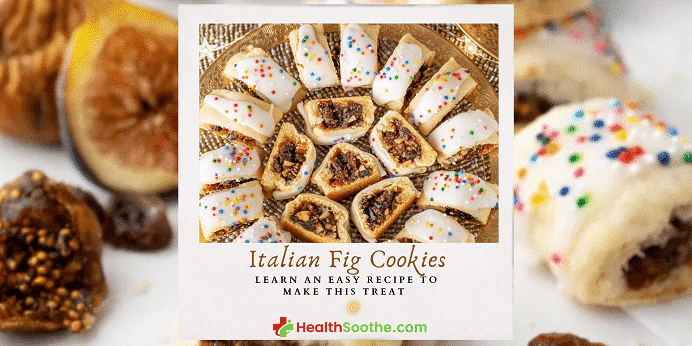Italian Fig Cookies, Cucidati, Sicilian Fig Cookies, or Christmas Fig Cookies are a few of the names you might find for this deliciously moist, tender, and sweet-fruit-filled cookie.
[ninja_tables id=”72826″]
With notes of citrus from fresh orange juice and lemon zest, the unique and richly spiced filling is wrapped inside a buttery sugar cookie dough that’s a dream to work with.
Baked in strips and then sliced into individual cookies while warm, this method couldn’t be easier. Once cooled the cookies are drizzled with a lemon glaze and sprinkled with traditional holiday nonpareils.
The moist and lightly sweet filling in these Italian Fig Cookies is made by gently cooking the figs and chopped dates with a splash of rum, orange juice, cinnamon, and lemon zest.
Chopped almonds are stirred in at the end then the mixture is cooled before spreading on the tender strips of vanilla cookie dough.
The unique and wonderful flavor of Italian Fig Cookies is like no other! This recipe is a holiday must-make with a spicy, aromatic, fruity filling and simple sugar cookie dough.
Italian Fig Cookies (Cucidati)

Fig cookies are fruit-filled cookies that come from the Italian island of Sicily (that is why they are also called Italian Fig cookies). The dried figs, dates, nuts, and citrus tell the story of the island’s many influences, from Greece to the Middle East.
Filling ingredients ranged from all figs to a mixture of dried fruits. Some had marmalade, candied citron, or maraschino cherries. Some had no nuts, while others had multiple kinds of nuts. There were some with chocolate, but most without. Some add wine and coffee. All include at least a dash of brandy, while some are distinctly boozy.
You will have to end up leaning into the holiday spirit when deciding what to include in your version and this means going over the top. Figs, dates, and golden raisins are invited, along with walnuts and almonds. Marmalade or fresh orange lends flavor, sweetness, and a spoonful of honey. It’s all rounded out with a bit of warmth from winter spices and a splash of brandy.
Nutritional Information of Italian Fig Cookies Per Serving
Servings Per Recipe: 18
- Calories: 178
- Total Fat: 8g
- Saturated Fat: 2g
- Cholesterol: 10mg
- Sodium: 166 mg
- Total Carbohydrate: 24g
- Dietary Fiber: 1g
- Total Sugars: 13g
- Protein: 2g
- Vitamin C: 0mg
- Calcium: 26mg
- Iron: 1mg
- Potassium: 55mg
An Awesome Italian Fig Cookies Recipe
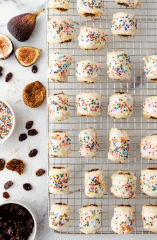
- Prep Time: 45 minutes
- Chill Time: 1 hour
- Cook Time: 18 minutes
- Total Time: 2 hours 3 minutes
- Yield: 75 cookies
Equipments & Kitchen Utensils Used: Danish whisk, rolling pin, food processor, bowls (large & small), box grater, parchment paper, teaspoons, sharp knife, tablespoons, cups, kitchen paper, baking sheet, hand or electric mixer, timer, oven, freezer, wire rack, piping bag or zip-lock bag, cake plate or serving board.
Ingredients
This recipe is divided into three parts: cookie dough, fig filling, and lemon glaze
For the cookie dough:
- Unsalted butter at room temperature
- Granulated sugar
- Light brown sugar
- One large egg, also at room temperature
- Vanilla extract for flavor
- All-purpose flour
- Baking Soda
- Salt
For the fruit filling:
- Dried Calimyrna or Mission Figs. These can be found in the dried fruit section of your local grocery store near raisins and nuts.
- Dried dates like Medjool, or substitute raisins if preferred.
- Fresh orange juice
- Dried, candied orange peel
- Granulated sugar
- Fresh lemon zest
- Ground cinnamon
- Finely chopped blanched almonds
- Spiced rum, Grand Marnier, or additional orange juice
For the lemon glaze (if that’s what you want to use):
- Powdered sugar
- Fresh lemon juice
- Sprinkles
OR
For the Icing (if that’s what you want to use)
- 1 cup of powdered sugar/confectioner’s sugar
- 1 tablespoon of milk
- Rainbow nonpareil sprinkles
How to Make Italian Fig Cookies
Once each of the components is prepared, the cookies come together quickly. I love a multi-step baking process that looks like you worked hard all day but is really easy to do.
- Prepare the cookie dough:
Using an electric mixer, beat the butter and sugar together until combined. Add the sugars, then the egg and vanilla.
In a separate bowl whisk together the dry ingredients. Add the flour mixture to the butter and sugar in three additions.
Divide the dough in half and form each portion into a small rectangle. Wrap the dough in plastic wrap and refrigerate.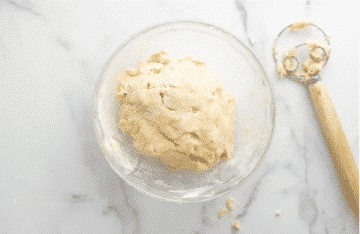
- Prepare the filling while the dough is chilling:
Combine the figs, dates, orange juice, candied orange peel, sugar, zest, and cinnamon in a small saucepan.
Cook until the fruit is soft and the mixture is thick. Remove from the heat and add the almonds and Grand Marnier or rum, if using. Set aside to cool.
- Assemble the cookies:
Roll one portion of the dough into a rectangle. Cut each rectangle in half. Portion 1/4 of the filling down the center of each strip of dough. CHILL the dough and filling as is for 15 minutes.
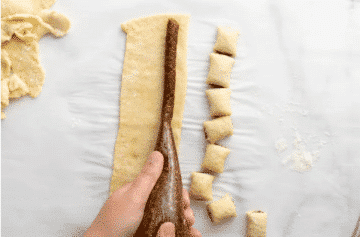 Fold the sides of the dough up and over the filling overlapping slightly. Seal the edges together forming a cylinder.
Fold the sides of the dough up and over the filling overlapping slightly. Seal the edges together forming a cylinder.
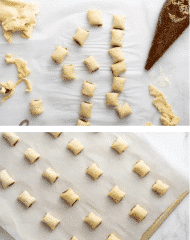 Transfer to the prepared baking sheet, seam side down.
Transfer to the prepared baking sheet, seam side down.
Bake the cookies until lightly browned. Remove from the oven and immediately slice each strip into 1-inch pieces. Cool completely on a wire rack before icing as shown above in the image above.
- Ice the cookies and decorate:
Combine powdered sugar and lemon juice. Drizzle over each cookie and top with sprinkles.
The Instructions Involved
For the Filling
- In the bowl of a food processor, add all of the ingredients for e filling. Pulse until smooth, thick paste forms. All ingredients should be very well blended and there should be no large pieces of fruit or nuts.
- Cover and set aside.
For the Dough
- To make the dough, start by adding the flour, salt, baking powder, and sugar in a large bowl.
- Whisk together until combined.
- Shred the cold butter over a small piece of parchment paper using a box grater. (see notes)
- Add the butter into the bowl of dry ingredients and gently toss the shredded butter until coated.
- In a small bowl, add the eggs and beat slightly with a fork. Add the vanilla extract and stir.
- Pour the egg mixture into the flour and butter mixture.
- Add the water, starting with ½ cup. Gently stir the wet ingredients into the flour (a Danish whisk works well here).
- If the dough is looking dry, add a little more water. Be careful not to add too much – the dough should never become wet or sticky.
- Using your hands, begin to bring the dough together into a large ball.
- Wrap the ball in a piece of plastic wrap and let it rest in the fridge for 1 hour.
Making the Cookies
- Preheat the oven to 350°F and prepare 2 baking sheets with parchment paper.
- Add the fig filling to a piping bag or large plastic zip lock bag. Cut a ½” opening at the tip of the bag.
- When ready, prepare a surface for rolling the dough. Take a portion of the dough and place it on a well-floured surface.
- Roll the dough to ⅛” thick in a long rectangle shape that is at least 5-6″ wide.
- Using a sharp knife, trim the dough to approximately 5-6″ wide and 10-12″ long. It’s ok if the dough is not as long – width is really most important here.
- Leaving a ½” edge on the side of the dough, pipe the filling down the full length of the dough area.
- With floured hands, use the edge to roll the dough over the piped fig mixture until it meets the other side of the dough surface.
- Cut along the seam and pull the roll away from the remaining rolled dough.
- Rotate the cookie roll so that the seam is on the bottom. Gently press to seal.
- Cut into 1 ½” pieces.
- Repeat steps 6 – 10 with the remaining rolled dough. For the second roll, there may be a small amount of excess dough on the edge, which should be trimmed.
- Place cookies onto the prepared baking sheet. Leave about 1 ½ inches of space in between each cookie.
- Bake for 15-18 minutes or until very lightly golden brown.
- Let them set on the for 5 minutes, and then transfer them to a wire rack to completely cool.
- While the cookies are cooling, make the glaze.
- In a small bowl combine the powdered sugar and milk until completely smooth.
- Add the icing to a piping bag or zip-lock bag. Cut a small amount off the tip.
- Drizzle the icing on top of the cookies without letting it drip down the sides showing the fig filling.
- Top with colored sprinkles such as rainbow nonpareils.
What Is in The Filling?
The dried fruit filling is very jammy and sweet.
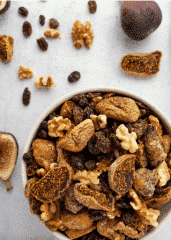 My recipe for Italian fig cookie filling is made from dried figs, raisins, walnuts, apricot jam, orange zest, and assorted spices. All the ingredients are pureed into a thick paste and rolled up inside a flaky cookie dough.
My recipe for Italian fig cookie filling is made from dried figs, raisins, walnuts, apricot jam, orange zest, and assorted spices. All the ingredients are pureed into a thick paste and rolled up inside a flaky cookie dough.
It is very easy to make and offers a lovely depth of flavor. You can definitely add other ingredients, like the ones mentioned above (honey, anise, etc.), but I found that my recipe is nicely balanced and well-rounded.
Filling Flavors & Texture
This is a very fruity filling with lots of richness and harmony from all of the ingredients. The warmth of the ground cinnamon and nutmeg, combined with the aromatic freshness of the orange will take you right into holiday mode.
After baking, the paste thickens up even more into a candy-like jam. It’s chewy and even though it is completely pureed, you also get some crunch from nuts and the seeds found inside figs.
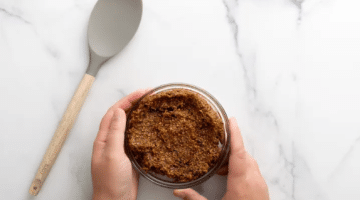
Don’t skip the Orange Zest –
I’ve found the orange zest to be a key ingredient in this cookie recipe. It adds just the right amount of brightness and freshness to the fig filling. It is aromatic and gives the Italian fig cookies a bright flavor. The combination of orange, spices, and dried fruit is nothing short of magical.
Any Substitute Ingredients?
Italian fig cookies can also be made without figs. You can substitute dried dates, more raisins, or dried cranberries for the figs. Any dried fruit would work great with this recipe! It would no doubt be delicious but would make them less traditional.
Are Cucidati or Italian Fig Cookies Christmas Cookies?
Cucidati or Italian fig cookies are traditionally made during Christmas time. With a filling of dried fruit and nuts, they bring sweetness to the table without relying on out-of-season fruit. These fig cookies are slightly labor-intensive and feel like a special treat. Making the filling used to require running the fruit and nuts through a grinder. And many recipes make dozens upon dozens of cookies, with the intention of cookie assembly being a family affair, with enough for everyone to take home. Italian fig cookies or Cucidati often make a reappearance in early March in communities where St. Joseph’s day is celebrated.
Fortunately, the invention of the food processor has cut down massively on the prep work. This recipe is easy enough to put together on your own, but special enough to be the star of your holiday cookie plate.
Italian Fig Cookies Are Perfect to add to your Christmas Traditions
People love Italian fig cookies for their simplicity and because they are usually served during the holiday season. They’re perfect as an after-dinner dessert or something to nibble on while you watch your favorite Christmas movies! Italian Fig Cookies can easily become part of your Christmas tradition.
[bwla_faq faq_topics=”frequently-asked-questions-related-to-fig-cookies” sbox=”1″ paginate=”1″ pag_limit=”5″ list=”1″ /]
Italian Fig Cookies (Cucidati) | Learn an Awesome Recipe for Making the Best Fig Cookies Ever
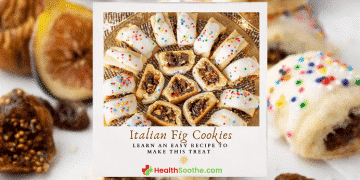
Cucidati or Italian fig cookies are traditionally made during Christmas time. With a filling of dried fruit and nuts, they bring sweetness to the table without relying on out-of-season fruit.
Type: Dessert
Cuisine: Italian
Keywords: Italian Fig cookies
Recipe Yield: 75 cookies
Calories: 178kcal
Preparation Time:
45M
Chlling Time: 1H
Cooking Time: 18M
Total Time: 2H3M
Recipe Ingredients:
- For the cookie dough:
- Unsalted butter at room temperature
- Granulated sugar
- Light brown sugar
- One large egg, also at room temperature
- Vanilla extract for flavor
- All-purpose flour
- Baking Soda
- SaltFor the fruit filling:
- Dried Calimyrna or Mission Figs
- Dried dates like Medjool, or substitute raisins if preferred
- Fresh orange juice
- Dried, candied orange peel
- Granulated sugar
- Fresh lemon zest
- Ground cinnamon
- Finely chopped blanched almonds
- Spiced rum, Grand Marnier, or additional orange juiceFor the lemon glaze (if that’s what you want to use):
- Powdered sugar
- Fresh lemon juice
- SprinklesFor the Icing (if that’s what you want to use):
- 1 cup of powdered sugar/confectioner’s sugar
- 1 tablespoon of milk
- Rainbow nonpareil sprinkles
Recipe Instructions:
For the Filling:
Step 1:
In the bowl of a food processor, add all of the ingredients for the filling. Pulse until smooth, thick paste forms. All ingredients should be very well blended and there should be no large pieces of fruit or nuts.
Step 2:
Cover and set aside.
For the Dough:
Step 3:
To make the dough, add flour, salt, baking powder, and sugar in a large bowl.
Step 4:
Whisk together until combined.
Step 5:
Using a box grater, shred the cold butter over a small piece of parchment paper. (see notes).
Step 6:
Add the butter into the bowl of dry ingredients and gently toss the shredded butter until coated.
Step 7:
In a small bowl, add the eggs and beat slightly with a fork. Add the vanilla extract and stir.
Step 8:
Pour the egg mixture into the flour and butter mixture.
Step 9:
Add the water, starting with ½ cup. Gently stir the wet ingredients into the flour (a Danish whisk works well here).
Step 10:
If the dough is looking dry, add a little more water. Be careful not to add too much – the dough should never become wet or sticky.
Step 11:
Using your hands, begin to bring the dough together into a large ball.
Step 12:
Wrap the ball in a piece of plastic wrap and let it rest in the fridge for 1 hour.
Making the Cookies:
Step 13:
Preheat the oven to 350°F and prepare 2 baking sheets with parchment paper.
Step 14:
Add the fig filling to a piping bag or large plastic zip lock bag. Cut a ½” opening at the tip of the bag.
Step 15:
When ready, prepare a surface for rolling the dough. Take a portion of the dough and place it on a well-floured surface.
Step 16:
Roll the dough to ⅛” thick in a long rectangle shape that is at least 5-6″ wide.
Step 17:
Using a sharp knife, trim the dough to approximately 5-6″ wide and 10-12″ long. It’s ok if the dough is not as long – width is really most important here.
Step 18:
Leaving a ½” edge on the side of the dough, pipe the filling down the full length of the dough area.
Step 19:
With floured hands, use the edge to roll the dough over the piped fig mixture until it meets the other side of the dough surface.
Step 20:
Cut along the seam and pull the roll away from the remaining rolled dough.
Step 21:
Rotate the cookie roll so that the seam is on the bottom. Gently press to seal.
Step 22:
Cut into 1 ½” pieces.
Step 23:
Repeat steps 6 – 10 with the remaining rolled dough. For the second roll, there may be a small amount of excess dough on the edge, which should be trimmed.
Step 24:
Place cookies onto the prepared baking sheet. Leave about 1 ½ inches of space in between each cookie.
Step 25:
Bake for 15-18 minutes or until very lightly golden brown.
Step 26:
Let them set on the for 5 minutes, and then transfer them to a wire rack to completely cool.
Step 27:
While the cookies are cooling, make the glaze.
Step 28:
In a small bowl combine the powdered sugar and milk until completely smooth.
Step 29:
Add the icing to a piping bag or zip-lock bag. Cut a small amount off the tip.
Step 30:
Drizzle the icing on top of the cookies without letting it drip down the sides showing the fig filling.
Step 31:
Top with colored sprinkles such as rainbow nonpareils.
85


